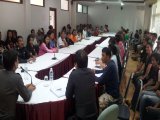THE THAI government has not arrested or charged a single soldier or official for any of the scores of deaths and hundreds of injuries during the political violence in Bangkok two years ago, Human Rights Watch said.
The Thai government should withdraw an amnesty bill submitted to parliament that would shield all those involved in abuses during the 2010 violence from prosecution, Human Rights Watch said.
In a video released on May 15, victims and their family members from both sides demand justice and tell Human Rights Watch that the failure to investigate and prosecute those responsible for abuses during the 2010 violence would lead to a cycle of violence and impunity.
''Despite well-documented atrocities that took place in the full view of cameras and witnesses, no Thai soldier or official has been held accountable,'' said Brad Adams, Asia director at Human Rights Watch. ''The military should not be above the law.
''The government needs to prosecute all those responsible for crimes, whatever their political affiliation or official position, to provide justice for the victims and end the cycle of violence and impunity.''
From March to May 2010, the United Front for Democracy against Dictatorship (UDD), known as the Red Shirts, held a mass protest against the government. In Thailand's most violent political confrontations since pro-democracy protests against military rule in 1992, at least 90 people died and more than 2000 were injured.
Arson attacks in and outside Bangkok also caused billions of dollars in damage. Human Rights Watch's May 2011 report 'Descent into Chaos' concluded that the military used excessive and unnecessary lethal force and that armed elements within the UDD called Black Shirts engaged in attacks.
The previous government of Prime Minister Abhisit Vejjajiva established the Truth for Reconciliation Commission of Thailand to investigate and report on the 2010 violence. The Abhisit government charged UDD leaders and hundreds of UDD protesters with serious criminal offenses, but did not file charges against any government officials or military personnel.
Since the government of Prime Minister Yingluck Shinawatra took office in August 2011, the focus of criminal investigations has shifted entirely to cases in which soldiers were implicated, while ignoring those involving UDD violence.
According to the Justice Ministry, more than 600 people have been charged for alleged violence and other crimes in connection to the UDD protests. Of those charged, 290 were arrested and 53 of them remain in prison.
The Truth for Reconciliation Commission of Thailand found that the charges against many of the UDD protesters were summary and excessive. No soldiers or governments officials have been arrested or charged by either the Abhisit or Yingluck governments.
The investigation by the Department of Special Investigations (DSI) has progressed slowly. Of the more than 90 known deaths, only 16 cases have been sent by the DSI to the prosecutor to launch post-mortem inquests.
The Truth for Reconciliation Commission has missed a series of reporting deadlines and has not been given sufficient resources and powers to fulfill its mandate, Human Rights Watch said. Another inquiry conducted by the National Human Rights Commission has suffered from mistrust and lack of cooperation from participants in the events.
Families of victims from all sides told Human Rights Watch they welcome the decision by the Yingluck government to provide reparations to those harmed by the 2010 violence. However, many families fear that financial compensation will be offered as a substitute for a full investigation and a process for bringing perpetrators of violence to justice.
Human Rights Watch expressed grave concern about the March 27 proposal by the ruling Pheu Thai Party and coalition partners in the parliament for a broad amnesty for leaders and supporters of all political movements, politicians, government officials, and members of the security forces involved in the 2010 violence.
Former prime minister Thaksin Shinawatra on April 15 responded to those opposing the proposal for amnesty and political reconciliation that, ''Mother of Katekamol Akhard, volunteer nurse who died during the dispersal at Ratchaprasong, is still angry that her daughter was shot by soldiers and does not want to have amnesty ??? But we have to listen to [what is] the greater good. And the minority [voice] should make a sacrifice.''
''The Yingluck government came to power promising justice to the victims of political violence. It should resist pressures to engage in a whitewash,'' Adams said. ''Current efforts to pass an amnesty law for serious abuses committed by government forces and armed protesters would be an affront to victims, who seek and deserve justice.''
The Thai government should withdraw an amnesty bill submitted to parliament that would shield all those involved in abuses during the 2010 violence from prosecution, Human Rights Watch said.
In a video released on May 15, victims and their family members from both sides demand justice and tell Human Rights Watch that the failure to investigate and prosecute those responsible for abuses during the 2010 violence would lead to a cycle of violence and impunity.
''Despite well-documented atrocities that took place in the full view of cameras and witnesses, no Thai soldier or official has been held accountable,'' said Brad Adams, Asia director at Human Rights Watch. ''The military should not be above the law.
''The government needs to prosecute all those responsible for crimes, whatever their political affiliation or official position, to provide justice for the victims and end the cycle of violence and impunity.''
From March to May 2010, the United Front for Democracy against Dictatorship (UDD), known as the Red Shirts, held a mass protest against the government. In Thailand's most violent political confrontations since pro-democracy protests against military rule in 1992, at least 90 people died and more than 2000 were injured.
Arson attacks in and outside Bangkok also caused billions of dollars in damage. Human Rights Watch's May 2011 report 'Descent into Chaos' concluded that the military used excessive and unnecessary lethal force and that armed elements within the UDD called Black Shirts engaged in attacks.
The previous government of Prime Minister Abhisit Vejjajiva established the Truth for Reconciliation Commission of Thailand to investigate and report on the 2010 violence. The Abhisit government charged UDD leaders and hundreds of UDD protesters with serious criminal offenses, but did not file charges against any government officials or military personnel.
Since the government of Prime Minister Yingluck Shinawatra took office in August 2011, the focus of criminal investigations has shifted entirely to cases in which soldiers were implicated, while ignoring those involving UDD violence.
According to the Justice Ministry, more than 600 people have been charged for alleged violence and other crimes in connection to the UDD protests. Of those charged, 290 were arrested and 53 of them remain in prison.
The Truth for Reconciliation Commission of Thailand found that the charges against many of the UDD protesters were summary and excessive. No soldiers or governments officials have been arrested or charged by either the Abhisit or Yingluck governments.
The investigation by the Department of Special Investigations (DSI) has progressed slowly. Of the more than 90 known deaths, only 16 cases have been sent by the DSI to the prosecutor to launch post-mortem inquests.
The Truth for Reconciliation Commission has missed a series of reporting deadlines and has not been given sufficient resources and powers to fulfill its mandate, Human Rights Watch said. Another inquiry conducted by the National Human Rights Commission has suffered from mistrust and lack of cooperation from participants in the events.
Families of victims from all sides told Human Rights Watch they welcome the decision by the Yingluck government to provide reparations to those harmed by the 2010 violence. However, many families fear that financial compensation will be offered as a substitute for a full investigation and a process for bringing perpetrators of violence to justice.
Human Rights Watch expressed grave concern about the March 27 proposal by the ruling Pheu Thai Party and coalition partners in the parliament for a broad amnesty for leaders and supporters of all political movements, politicians, government officials, and members of the security forces involved in the 2010 violence.
Former prime minister Thaksin Shinawatra on April 15 responded to those opposing the proposal for amnesty and political reconciliation that, ''Mother of Katekamol Akhard, volunteer nurse who died during the dispersal at Ratchaprasong, is still angry that her daughter was shot by soldiers and does not want to have amnesty ??? But we have to listen to [what is] the greater good. And the minority [voice] should make a sacrifice.''
''The Yingluck government came to power promising justice to the victims of political violence. It should resist pressures to engage in a whitewash,'' Adams said. ''Current efforts to pass an amnesty law for serious abuses committed by government forces and armed protesters would be an affront to victims, who seek and deserve justice.''












Amazing Thai democracy!
Posted by Coralie on May 17, 2012 08:57